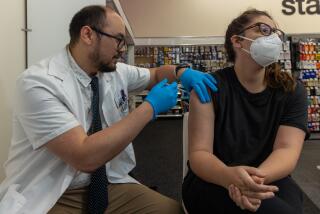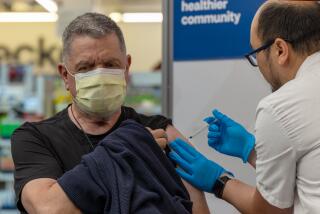Flu Puts Strain on Hospitals, Workplaces : Illness: Though officials have no way of knowing how many people have come down with the Beijing flu, they do know the virus is hitting hard, as skeleton staffs and a rush on medicines prove.
- Share via
So, you’ve got a fever? Worn out? Can’t seem to stop coughing and your nose is raw from blowing?
Chances are, you’re among the miserable legions who have been stricken by a debilitating strain of the flu that is sweeping Orange County and much of the nation, leaving businesses with skeleton staffs and causing a rush on flu medicines.
County health officials say there is no way of determining how many people in Orange County have come down with the Beijing flu, also known as Influenza A, primarily because most people use over-the-counter drugs and don’t go to doctors.
According to the federal Centers for Disease Control and Prevention in Atlanta, California was among six states that reported regional outbreaks of Beijing flu for the week ending Dec. 11. Oregon and Florida reported widespread outbreaks.
One need only take a trip to the local pharmacy to figure out that a virus--or a number of viruses--is being passed around.
“It’s been crazy,” said one embattled drugstore clerk in Santa Ana. “All we’re doing is restocking the shelves with cough medicine and antibiotics.”
The dreaded virus, believed to have set in sometime in November, has sent other victims to local hospitals for treatment. At Children’s Hospital of Orange County in Orange, scores of children complaining of flu-like symptoms have crowded into the clinic.
“We’ve seen a million and one children here,” said Abby Rubenstein, the hospital’s infection control coordinator. “Some of the children who have come in have really been quite ill.”
Since November, the hospital has diagnosed 42 cases of Influenza A--half of those in the past two weeks. But many other sick children have sought treatment for other viral infections with similar symptoms: fever, cough, aches, chills, congestion and runny noses.
“There are a lot of viral illnesses that get called ‘flu’ but influenza is a much more serious illness,” Rubenstein said. “Half of the people who tested positive were hospitalized.”
Rubenstein and other health officials advised parents not to bring their children in for treatment unless their symptoms appear serious because of the risk that they could become infected through exposure to other sick patients.
“The question is how sick is your kid and will he get sicker sitting in the waiting room,” Rubenstein said.
Doctors are also advising people with the flu or flu-like symptoms to get plenty of rest and drink lots of fluids. But Dr. David Dassey, an epidemiologist with the Los Angeles County Department of Health Services, warned against taking aspirin. He said people, especially children, who ingest aspirin while sick with flu run the risk of contracting Reye’s syndrome, a rare but often fatal disease that causes swelling of the brain and liver.
Generally, flu sufferers will be sick five to seven days,said Dr. Donald Levy, an allergist and immunologist in Orange who has treated dozens of flu victims in recent weeks.
“But if you’re an average, healthy person, it’s not as devastating,” he said.
Meanwhile, health officials stressed that influenza is contagious and urged elderly people and those with serious medical problems to seek treatment.
“Influenza is known for its ability to produce epidemics and rapid illness,” said Dr. Hildy Meyers, an epidemiologist for the Orange County Health Care Agency. “We advise elderly people and others with a history of medical complications to take flu medications.”
Meyers said two prescription drugs, amantadine and rimantadine, are available for treatment of the flu. She also suggested that people in high-risk groups who have not already contracted the virus get a preventive injection.
However, many physicians recommend flu shots only for people in these target groups because of the possible negative side effects and because the shots are only about 70% effective.
“The potential benefits outweigh the risks if someone has a chronic illness like a respiratory or cardiac disease,” Levy said. “But the recommendations are for the average person not to have have flu shots because some people can get flu-like symptoms from the shot itself.”
More to Read
Sign up for Essential California
The most important California stories and recommendations in your inbox every morning.
You may occasionally receive promotional content from the Los Angeles Times.













